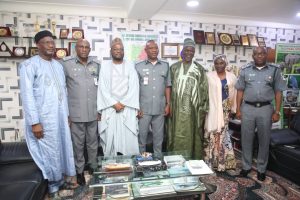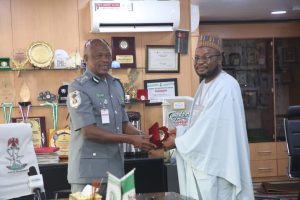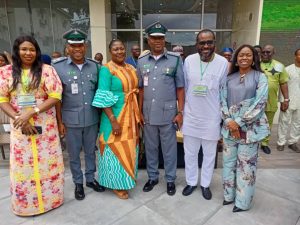
Customs Comptroller General, Bashir Adewale Adeniyi, MFR has taken a review of his 100 days in office, saying the new focus of the service has been completely re-engineered since the new leadership came into existence.
In the new policy thrust, he noted that revenue and border security as well as factors that will aid trade facilitation has been given a priority.
In the words of Mahatma Gandhi, “You must be the change you wish to see in the world.” Today, we do more than just envision change; we celebrate the tangible strides we have taken in shaping the destiny of the Nigeria Customs Service. Our mission from day one has been rooted in a clear and inspiring vision, one that revolves around the principles of consolidation, collaboration, and innovative solutions. These principles have guided our actions and decisions, propelling us toward a future marked by excellence, efficiency, and effectiveness.
Customs, as we all know, plays a pivotal role in facilitating international trade and economic growth. It serves as a bridge connecting our nation to the global marketplace. Over the past 100 days, I have witnessed firsthand the dedication and resilience of the men and women of the Nigeria Customs Service. Together, we have embarked on a journey to reshape the future, united in our mission to build a better Service. Today, I am honoured to share with you the progress we have made, the challenges we have faced, and the path forward as we work hand in hand to build a more prosperous Nigeria.
During these first 100 days in office, I’ve had the privilege of witnessing the dedication and commitment of our Customs officers across the nation. Allow me to share a personal insight from this journey. In the early days of my tenure, I had the opportunity to visit one of our border posts. As I watched our officers work tirelessly to ensure the smooth flow of goods and safeguard our borders, I was reminded of the profound impact that the Nigeria Customs Service has on our nation’s prosperity and security.

It is this very impact that inspires our forward-thinking and progressive vision: “To become the most efficient and service-driven government organ, with a relentless focus on revenue growth and border security.” This vision, underpinned by our mission to consolidate our positive legacies, collaborate with all stakeholders, and create innovative solutions, drives us to set new standards of excellence.
At the heart of our vision are our core values: community-focused, collaboration, integrity, excellent service, and innovative solutions that propel the Nigeria Customs Service forward. These values guide our every action, ensuring that we not only meet the needs of our great nation today but also anticipate and prepare for the challenges and opportunities of tomorrow. In a rapidly changing world, it is crucial that we maintain a forward-thinking and progressive perspective. The importance of this approach cannot be overstated, as it is the key to our continued success in facilitating trade, securing our borders, and contributing to Nigeria’s economic growth and development.
The policy thrust of “Consolidation, Collaboration, and Innovative Solutions” is not merely a collection of words; it represents the very essence of our mission in the Nigeria Customs Service. It signifies our unwavering commitment to building upon the foundation of excellence laid by our predecessors, forging stronger partnerships with key stakeholders, and continuously seeking innovative solutions to the challenges we face.
This policy thrust holds profound significance for several reasons. Firstly, it acknowledges the need to consolidate the positive legacies of the Customs Service, recognizing that our history is rich with achievements that must be preserved and built upon. Secondly, it places a strong emphasis on collaboration, understanding that we cannot operate in isolation. To thrive in the complex landscape of international trade and security, we must work closely with our fellow agencies, the private sector, and other stakeholders. Lastly, it underscores the importance of innovation as a driving force behind our progress. In today’s dynamic world, embracing innovative solutions is not an option but a necessity.

Our chosen policy thrust seamlessly aligns with the overarching vision for the Nigeria Customs Service – “To become the most efficient and service-driven government organ, with a relentless focus on revenue growth and border security.” By consolidating our strengths, collaborating effectively, and fostering innovation, we are not only fulfilling our vision but also setting the standard for excellence in government service.
The synergy between our vision and policy thrust creates the requisite momentum that propels us forward. We recognize that to be the best, we must consistently strive to improve our efficiency, enhance our service delivery, and secure our borders. This alignment ensures that our efforts remain steadfastly directed towards achieving our mission and, ultimately, serving our great nation with dedication and distinction.
Our chosen policy thrust was not arrived at by chance; it was deliberately aligned with the Policy Advisory Council Document of the President Tinubu Led Administration and the eight priority areas of the government. These priorities include food security, ending poverty, economic growth and job creation, access to capital, improving security, improving the ease of doing business, upholding the rule of law, and fighting corruption.
In embracing “Consolidation, Collaboration, and Innovative Solutions,” we are not only advancing the interests of the Nigeria Customs Service but also contributing significantly to the broader national agenda. Our dedication to enhancing revenue growth, border security, and the ease of doing business directly supports the government’s efforts in economic growth, job creation, and upholding the rule of law. This alignment underscores our commitment to being a proactive partner in achieving the collective goals of our nation. Our chosen policy thrust serves as the compass in our journey towards a more efficient, collaborative, and innovative Nigeria Customs Service.
 Ladies and gentlemen, it is important to recognize that the adoption of our policy thrust, “Consolidation, Collaboration, and Innovative Solutions,” came at a juncture when traditional approaches were showing signs of limitations. Key performance indicators for the Nigeria Customs Service were revealing gaps that demanded immediate attention. Revenue collection consistently fell short of the monthly target of 307 billion Naira during the first half of the year. Traders faced unnecessary delays resulting from multiple layers of checks and enforcement, increasing the cost of doing business and impeding the flow of goods at our ports. Our over-reliance on informants proved to be less effective, as they often shared the same information with those on the wrong side of the law. Furthermore, stakeholders were growing increasingly marginalized in decisions that directly impacted their operations. These were challenges that my predecessor was diligently addressing, and we have built upon those efforts.
Ladies and gentlemen, it is important to recognize that the adoption of our policy thrust, “Consolidation, Collaboration, and Innovative Solutions,” came at a juncture when traditional approaches were showing signs of limitations. Key performance indicators for the Nigeria Customs Service were revealing gaps that demanded immediate attention. Revenue collection consistently fell short of the monthly target of 307 billion Naira during the first half of the year. Traders faced unnecessary delays resulting from multiple layers of checks and enforcement, increasing the cost of doing business and impeding the flow of goods at our ports. Our over-reliance on informants proved to be less effective, as they often shared the same information with those on the wrong side of the law. Furthermore, stakeholders were growing increasingly marginalized in decisions that directly impacted their operations. These were challenges that my predecessor was diligently addressing, and we have built upon those efforts.
In our first 100 days in office, we embarked on a comprehensive overhaul of the Nigeria Customs Service, guided by our policy thrust. We recognized that to effect real change, we needed to incrementally challenge the status quo and instigate a transformation that was both dynamic and results oriented. One of our primary objectives was to optimize revenue collection. We introduced a series of reforms aimed at plugging revenue leakages, streamlining the customs clearance process and addressing the existing gaps at the time. Some of the noteworthy measures implemented during this period include:
The immediate set up of a Revenue Review Performance Recovery Team
Dissolution of existing Strike Force Teams that constituted the multiple layers of enforcement into the recognised structure of Federal Operations Unit (FOU). This was done to reduce the multiple checkpoints from about 5 Units of checks at every stretch to just 2 that should comprise the either the command or the FOU.
The introduction of the Advanced Ruling system represents a notable stride in aligning our operations with global best practices, in line with the recommendations of the WTO TFA (World Trade Organization Trade Facilitation Agreement).

The inauguration of a Steering Committee on the Implementation of the Authorised Economic Operators for Compliant Traders, with a clear focus on transitioning from the existing Fastrack 2.0 to the AEO concept.
Interactions with the international community – WCO, JICA, Japan Customs among others on the implementation of the Customs Laboratory, adoption of geospatial, conduct of a Time Release Study to mention a few.
Completion of 2 Working engagements with the Customs Administration of the Republic of Benin, each paid by both administrations, to address the existing gaps that sustains the activities of smugglers and revenue leakage.
The establishment of a committee tasked with revitalizing the zonal structures of the service, granting them the authority to rejuvenate the Service.
The reconstitution of a new management team, appointed strictly based on merit, upholding the principle of equitable geopolitical representation.
The commencement of the integration process for Customs Basic and intermediary institutions into the administrative framework of the Nigeria Customs Service.
A strategic reassignment of Customs Area Controllers, also rooted in merit and in adherence to the principle of equitable geopolitical representation.

The initiation of the development of a Corporate Social Responsibility Strategy for the Nigeria Customs Service, harmonized with the goal of contributing to the government’s development agenda, fostering enduring and positive relationships with communities, elevating the NCS’s reputation as a socially responsible organization, and enhancing staff engagement and productivity.
The creation of an ideas bank comprising feedback and comments gathered during the operational visits to Customs commands.
Reenergised the activities of the National Trade Facilitation Committee through engagements and the hosting of a retreat to chat the way forward on Trade Facilitation in Nigeria.
Finalised arrangements with the Federal Road Safety Corps (FRSC) to integrate our systems and minimise the registration of smuggled vehicles.
Held engagements with several stakeholders including government agencies, non-governmental agencies and the private sector, to mention a few.
The prompt clearance of arrears for officers, serving as an interim measure to boost their morale, while further incentives are under consideration.
The introduction of the Work-Life Balance (WLB) initiative, aimed at enhancing officers’ well-being and welfare, signifies our unwavering commitment to ensuring that our dedicated personnel lead balanced and fulfilling lives while maintaining peak performance in their roles.
Our activities over the past 100 days have also been guided by 4 strategic objectives. Firstly, we are dedicated to promoting open governance within the Nigeria Customs Service, ensuring that our processes and operations are characterized by transparency and accountability. Secondly, our unwavering focus remains on growing government revenue, a crucial endeavour that enables us to fulfil our mandate effectively. Additionally, our dedication to fostering collaborations with stakeholders has been instrumental in achieving our goals, as we recognize that collective efforts yield the best results. Lastly, we have initiated comprehensive efforts to build a robust organizational structure that will sustain and enhance NCS operations in the long term. These four pillars—transparency, revenue growth, collaboration, and structural fortification—have provided the framework for our actions and initiatives.

These activities have led to some milestones that we are eager to share with Nigerians. Permit me to highlight a few key achievements:
Enhanced Revenue Generation. One of our early achievements has been a remarkable boost in monthly revenue collection. We’ve witnessed a substantial increase, with an average monthly collection of 202 billion in the first half of the year that concluded in June, surging to an impressive 343 billion in the past two months (July and August). This outstanding growth amounts to a remarkable 70.13% increase in revenue collection. I’m delighted to announce that we’ve consistently exceeded the monthly target collection of 307 Billion Naira, marking a remarkable departure from previous performances. The ongoing Revenue Recovery review activities have contributed an additional 8 billion Naira during this period, underlining our commitment to revenue generation. Subject to unforeseen circumstances, our aim is to sustain and even expand this momentum until the end of the year. This commitment is driven by our resolve to minimize the deviation from the target, especially in light of the substantial shortfalls recorded during the first half of the year.
Combatting Smuggling. In the ongoing battle against smuggling, the NCS has achieved impressive results over the past eight months. With a total of 1,763 seizures, valuing a substantial 11.9 billion Naira in Duty Paid Value, we have successfully intercepted various contraband items, including arms, ammunition, illicit drugs, substandard pharmaceuticals, and other prohibited goods that pose grave risks to our citizens. These seizures, accompanied by the apprehension of 62 suspects undergoing legal procedures, underscore our commitment to tackling smuggling and safeguarding our communities. Notably, a significant surge in impactful seizures, especially involving arms, ammunition, and drugs, has occurred in the past two months, reinforcing our resolve to combat these illegal activities.
Strengthened Collaboration. We forged stronger alliances and fostered an environment of trust and cooperation among our stakeholders including the Public and Private sector as well as our international partners.
Innovative Solutions. We at the verge of introducing multiple cutting-edge solutions to support our enforcement strategies starting with the signing of an MOU later today that seeks to put vehicle smugglers out of business for good.
Stakeholder Engagement. We prioritized stakeholder engagement, recognizing the critical role they play in our operations. We established regular channels for dialogue, ensuring that their voices are heard and considered in decision-making processes.
To measure our progress and ensure our continued success, we have identified key performance indicators (KPIs) supported by concrete data. These KPIs include:
Monthly Revenue Collection. We will closely monitor and report on our monthly revenue collection to track our performance.
Average Clearance Time. We will measure the time it takes to clear goods at ports and border posts, aiming for continuous reductions in clearance times.
Stakeholder Satisfaction. To gauge our collaboration efforts, we will regularly solicit feedback from stakeholders, including traders, to assess their satisfaction with our services.
Operational Efficiency. We will measure the efficiency of our operations by monitoring the number of cargo inspections, seizures, and clearances to ensure optimal resource utilization.

It is essential to acknowledge that despite our early successes, we have encountered certain challenges during the initial phase of implementing our policy thrust. These challenges include resistance to change, bureaucratic bottlenecks, dissonance in fiscal and monetary policies, the need to reorient the mindset of some officers and stakeholders, and the persistent issue of smuggling. Additionally, the dynamic nature of international trade and emerging threats necessitates constant adaptation and innovation.
These challenges, if left unaddressed, have the potential to impede our progress and hinder the achievement of our objectives. Resistance to change, for instance, can slow down the implementation of new and innovative solutions. Bureaucratic bottlenecks can lead to delays in decision-making and hamper our ability to respond swiftly to evolving situations. Dissonance in fiscal and monetary policies can create inconsistencies that affect revenue collection. Moreover, any reluctance among officers and stakeholders to embrace our vision for the Nigeria Customs Service could undermine the synergy required for effective collaboration and innovation. The persistent issue of smuggling poses a significant challenge to our efforts in revenue collection and border security. Smugglers continually adapt their tactics, making it crucial for us to stay ahead of them through innovative strategies and increased cooperation with relevant agencies.
However, I want to assure you that these challenges are not insurmountable. We are committed to addressing them proactively and leveraging them as opportunities for growth and improvement. Our journey towards consolidation, collaboration, and innovative solutions demands resilience and adaptability, and we are fully prepared to meet these challenges head-on.
As we reflect on the achievements of the first 100 days in office and the journey we have embarked upon, it is essential to look ahead with a clear vision for the future. Our next phase builds upon the foundation we have laid, and it is characterized by unwavering dedication to our policy thrust of consolidation, collaboration, and innovative solutions. Looking forward, we envision a Nigeria Customs Service that is not only the most efficient and service-driven government organ but also a pivotal driver of national economic growth and border security.
Expectations for the road ahead are high, and rightly so. We are committed to continued growth and improvement, driven by our unyielding determination to serve our nation better. In the coming months and years, we anticipate significant strides in various areas, including revenue collection, trade facilitation, and border security. We must not only meet but exceed our targets, and this requires collective effort and dedication from every member of our team.
I want to inspire and emphasize the importance of your commitment and dedication to our shared vision. Together, we are embarking on a journey that will redefine the Nigeria Customs Service. To set the stage for our future endeavours:
We will reinforce a culture of transparency, ethical conduct, and zero tolerance for corruption. By implementing stringent measures, we will ensure that every officer operates with integrity and professionalism.
We will invest in cutting-edge technologies to enhance our surveillance, monitoring, and data management capabilities. This will not only streamline our processes but also significantly improve our ability to combat smuggling and other illicit activities.

In today’s data-driven world, harnessing the power of analytics is paramount. We will integrate data analytics into our customs processes to improve risk assessment, intelligence gathering, and decision-making. By leveraging data-driven insights, we will enhance our ability to detect irregularities and improve overall efficiency.
- We will dedicate an Export Terminal to promote exports in line with the policy direction of the government.
- We will extend our consultations and collaboration to other agencies of government, fostering a harmonious working relationship for the benefit of our nation.
- Our commitment to modernizing customs operations remains unwavering, as does our determination to ensure compliance with the provisions of the law, particularly in Free Trade Zones.
- Additionally, we will embark on implementing the Nigeria Customs Service Corporate Social Responsibility Strategy, reinforcing our role as a responsible and responsive organization.
- Our officers are the backbone of the Nigeria Customs Service, and their welfare is of paramount importance. We are committed to providing better working conditions, competitive remuneration, and enhanced training opportunities. By prioritizing their well-being, we will empower our officers to perform at their best.
- We are also expanding our Work-Life Balance initiative, ensuring the welfare of our officers remains a top priority.
- We recognize the importance of prioritizing capacity building for our officers, focusing on developing lifelong skills that will empower them both professionally and personally.
As I conclude, let us embrace the future with optimism and determination. Our vision is bold, but with unity and unwavering commitment, we will achieve it. The challenges may be great, but so is our collective resolve to overcome them. Together, we will consolidate our positive legacies, collaborate for the greater good, and create a future where the Nigeria Customs Service stands as a beacon of efficiency, integrity, and innovation. Thank you, and may God bless our efforts and our great nation, Nigeria.
May I also express my heartfelt gratitude to every member of our dedicated team and our esteemed partners. Your unwavering support, hard work, and shared vision have been the driving force behind our achievements in the first 100 days. As we move forward, let us remain committed to our policy thrust of consolidation, collaboration, and innovative solutions. Together, we will continue to break new ground, overcome challenges, and set higher standards of excellence. Our journey has only just begun, and I am confident that with unity, determination, and a relentless focus on our goals, we will shape a brighter future for the Nigeria Customs Service and our beloved nation. Thank you, and may our efforts lead us to even greater heights.

